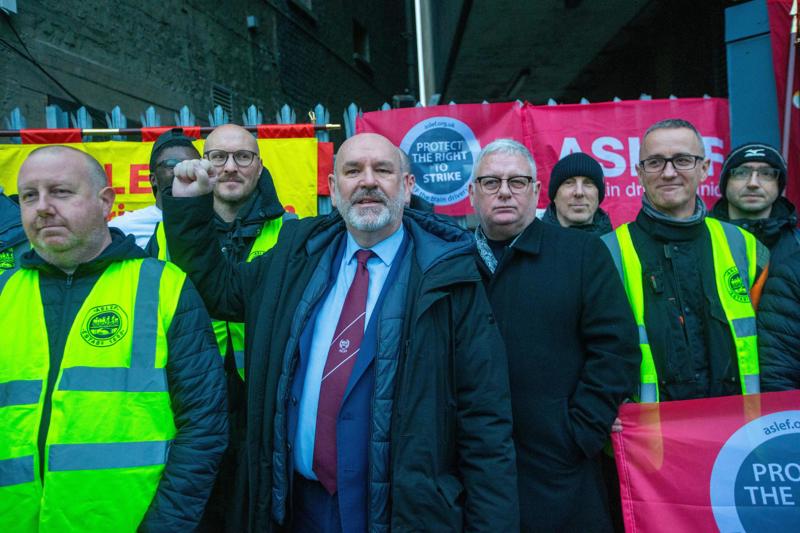Stability is key to a successful railway, and our new government says that its decision to resolve the two-year dispute with drivers’ union ASLEF is a major step towards achieving this ideal. But is this true, or just political spin?
The price for ending this series of strikes is estimated to be more than £100 million.
Stability is key to a successful railway, and our new government says that its decision to resolve the two-year dispute with drivers’ union ASLEF is a major step towards achieving this ideal. But is this true, or just political spin?
The price for ending this series of strikes is estimated to be more than £100 million.
Labour’s justification is that it will cost the country more in lost revenue and taxes if the wave of walkouts is allowed to drift on.
The government is walking a tightrope. Aggrieved unions representing other sections of the UK’s entire national workforce will view ASLEF’s success as an opportunity to improve their lot, but they have already been warned that there is no blank cheque.
Back to our railways, it is a concern that the hoped-for stability is just not there.
At the beginning of August, more than 20 separate disputes remained unsettled and not expecting an early resolution.
ASLEF members have been happy to pocket around £9,000 each - an effective 15% pay rise over three years, with a ‘no strings’ offer in terms of changes to their working conditions.
However, it’s not quite over with ASLEF.
Its East Coast Main Line crews have just instituted a separate overtime ban (until November 30) over what they claim are “inflexible rosters” that disrupt their normal working lives.
These can best be described as internal issues, but they will affect passengers because maintaining a quality service relies on their goodwill through acceptance of regular overtime, plus Sunday and rest time working.
The government has tasked both sides to get round the discussion table, a curious move when it owns East Coast operator LNER.
Meanwhile, the RMT union’s long-running row about better pay and conditions rumbles on.
The TSSA, which represents managerial, professional and technical grades, is also unhappy.
As is Unite, whose members are rolling stock engineering grades, cleaners, ticket agents, hospitality assistants and conductors.
And there’s more… London Underground staff are disgruntled about pay, pensions and crew rostering, while Avanti West Coast and TransPennine Express conductors are demanding extra reward for scanning e-tickets.

Mick Whelan (centre) at ASLE picket line Waterloo Jan 30 (ALAMY 2WFBM4C (1))
Chancellor of the Exchequer Rachel Reeves set out her stall in an interview in The Guardian on August 23, declaring that she doesn’t have a bottomless purse.
She has strongly denied that she has caved in to ASLEF, and that her decision is simply accepting recommendations from pay review bodies. She added that future significant increases for police, teachers and the armed forces will solve severe recruitment problems, although whether this would also apply to the railway industry is open to debate.
Like everyone else in the Labour government, Reeves’ mantra is that she has inherited 14 years of Conservative misrule. But regardless of whether this is true or false, it seems unclear how she will grow the national economy if wage demands force up inflation again and the Stock Exchange takes a tumble.
We, the taxpayers, are already well primed for increases this autumn. Will there also be another above-inflation hike in rail fares?
Transport Secretary Louise Haigh could soon be udner pressure to wheel out the time-honoured but wearisome spiel that rail users must contribute their fair share of the cost of change for the better, whatever that might be.
And who will pay for the likely massive bill for bringing all train operators back into the public domain? That money has to come from somewhere, so will it come from trimming the railway investment budget or higher-priced tickets? We presume it will be a combination of the two.
We should brace ourselves for a ‘review’ of already-agreed major rail projects (‘review’ is another word for postponement or cancellation). Reeves’ get-out clause here is that while the former Conservative government talked the talk, it failed to set aside any funds. These are her words: “You can’t deliver projects on the never-never. I’m not going to make pledges without saying where the money is coming from.”
The cancellation of Restoring Your Railway (rose-tinted railway expansion schemes that were built on sand) can now be better understood. The saving of £72m (less than the £100m-plus needed to appease ASLEF) was only to develop ideas for projects that would cost several billion pounds to see through. The same applies to others to be built from savings from the cancellation of HS2’s Manchester extension, using even more cash that doesn’t actually exist.
Just two months into the new Labour government, it seems that its wholesale ‘pain before gain’ policies are going to hit rail customers harder than expected.
Login to continue reading
Or register with RAIL to keep up-to-date with the latest news, insight and opinion.



















Login to comment
Comments
No comments have been made yet.